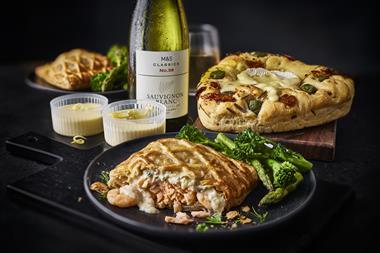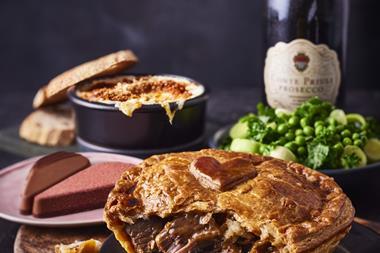Sir Ken's imminent retirement and this week's much-anticipated results meant a story about Morrisons' decision to source all its fresh meat from British farmers was likely to be overshadowed.
But industry pundits and farmers alike believe the move is great PR for the Bradford-based supermarket, giving further momentum to its superb recovery story. And Morrisons aims to capitalise with a new TV ad campaign out shortly.
But how significant is the move for Morrisons, for farmers and for rivals? Morrisons CEO Marc Bolland has been a big supporter of British farmers, following earlier decisions to source all its pork and lamb from UK suppliers.
"It starts with the consumer, who wants to support British farming. But we think we can get the quality, as well as having total provenance on our meat supply."
The move gives further momentum to the resounding recovery story presented to the City by the Flying Dutchman this week.
Morrisons must also hope it can boost its share of fresh beef sales. With 12.6% of the market, according to TNS, it is well behind big four rivals Tesco (26.4%), Asda (16%) and Sainsbury's (15.4%).
Since it already sources 95% of its fresh beef from UK producers, at face value it will have little impact for farmers, though that extra 5% will boost its demand by 7,500 head of cattle a year. "That's quite a few farms' production," says Morrisons corporate affairs director Chris Blundell. "We are buying top-spec animals and are among the top payers in the market."
As a result, Richard Cullen, category development manager at the Meat & Livestock Commission, predicts "consumers can expect a slight increase in price, unless Morrisons is prepared to take a margin hit".
However, Bolland says it will stay competitive "by not shipping our meat over the ocean. Since we own our own supply, there's no food mileage."
Alastair Johnston, NFU livestock adviser, agrees. "With its own slaughtering and processing facilities, it has whole carcase utilisation and can put the cuts into mince or pies - other supermarkets can't do that because they just buy primal cuts."
Indeed, as a recent promotion on its all-British lamb has shown, Morrisons can already be very competitive when it wants to be. And it's shown it can have an impact on the sourcing policies of its rivals, too, who extended their seasons for British lamb last year after Morrisons had committed to 100%-British fresh lamb.
So how likely is it that rivals will respond to the latest move? Since 82% of the beef retail market is sourced from Britain, according to MLC estimates, it would be impossible for them to change overnight
" We can't be 100% self-sufficient at the moment," says Johnston, "but would like to see the big retailers extend seasons and use British when it's available. Imported products must not undermine our product, they should be complementary to it."
More than 95% of Tesco's beef volumes are British. But corporate and legal affairs director Lucy Neville-Rolfe angered farmers at the NFU conference last month when she claimed that South American beef was of a higher quality than British.
"Where we do import it is only to ensure supply of certain cuts," a spokesman explains, adding: "We expect suppliers to reach exactly the same standards as UK producers and we label very clearly."
Asda is more encouraging. It has increased its fresh British beef volumes by 6% a year over the past two years, it claims, and plans to increase volumes by a further 12% this year - although Asda's spokesman could not comment on the current percentage it stocks. "Ideally we would like to source from local suppliers," he says. "But it is becoming more and more challenging.
"We are committed wherever possible to British beef being our number one choice. But we want to ensure we offer as much choice to customers at the best-possible value," the spokesman adds.
Like Asda, Sainsbury's sources its beef exclusively from Britain and Ireland - but refuses to comment on the percentage of Irish imports, as it varies depending on promotions.
For Martin Howlett, Cornwall NFU chairman, the Morrisons announcement is "really positive". He remains concerned, however, at the mixed messages sent by the multiples. "We need to get the right signals to continue."key points
Morrisons increasing fresh British beef sourcing from 95% to 100% - an increase of 7,500 cattle a year
It earlier committed to selling 100%-British fresh pork, lamb and poultry
Huge PR coup - to be exploited with advertising and in-store promotion
Integrated supply chain is key
Increased competition for already tight British beef supplies bodes well for farm prices
Farmers hope consumer demand and Morrisons' commitment will trigger other retailers to increase their use of British beef
But the big three retailers insist their policies will remain unchanged



















No comments yet